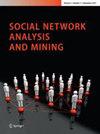分析推特上关于Covid-19疫苗辩论的变化格局
IF 2.3
Q3 COMPUTER SCIENCE, INFORMATION SYSTEMS
引用次数: 2
摘要
在2019冠状病毒病大流行期间,疫苗犹豫问题构成了一项重大挑战,因为它增加了破坏旨在减轻病毒传播的公共卫生干预措施的风险。虽然疫苗的迅速发展是一项了不起的科学成就,但它也在一些人群中引起了怀疑和担忧。在此背景下,欧洲药品管理局暂停阿斯利康疫苗进一步加剧了围绕疫苗安全性的激烈辩论。本文研究了围绕Covid-19疫苗的推特话语,重点关注讨论的时间和地理维度。利用一年多的数据,我们研究了五个国家(德国、法国、英国、意大利和美国)的公共辩论,揭示了互动结构的差异以及可疑和可靠来源的产量。主题建模强调了可靠来源和可疑来源的观点差异,但各国之间存在一些相似之处。此外,我们量化了疫苗宣布和暂停的影响,发现只有前者在所有国家都有显著影响。最后,我们分析了交互网络中社区的演变,揭示了一个相对稳定的场景,不同可靠性水平的社区之间有一些相当大的变化。我们的研究结果表明,就内容生产和互动模式而言,重大外部事件可能与在线辩论的变化有关。然而,尽管暂停了AZ,我们没有观察到与Covid-19疫苗相关的错误信息的生产和消费有任何明显变化。本文章由计算机程序翻译,如有差异,请以英文原文为准。
Analyzing the changing landscape of the Covid-19 vaccine debate on Twitter
Abstract The issue of vaccine hesitancy has posed a significant challenge during the Covid-19 pandemic, as it increases the risk of undermining public health interventions aimed at mitigating the spread of the virus. While the swift development of vaccines represents a remarkable scientific achievement, it has also contributed to skepticism and apprehension among some populations. Against this backdrop, the suspension of the AstraZeneca vaccine by the European Medicines Agency further exacerbated an already contentious debate around vaccine safety. This paper examines the Twitter discourse surrounding Covid-19 vaccines, focusing on the temporal and geographical dimensions of the discussion. Using over a year’s worth of data, we study the public debate in five countries (Germany, France, UK, Italy, and the USA), revealing differences in the interaction structure and in the production volume of questionable and reliable sources. Topic modeling highlights variations in the perspectives of reliable and questionable sources, but some similarities across nations. Also, we quantify the effect of vaccine announcement and suspension, finding that only the former had a significant impact in all countries. Finally, we analyze the evolution of the communities in the interaction network, revealing a relatively stable scenario with a few considerable shifts between communities with different levels of reliability. Our results suggest that major external events can be associated with changes in the online debate in terms of content production and interaction patterns. However, despite the AZ suspension, we do not observe any noticeable changes in the production and consumption of misinformation related to Covid-19 vaccines.
求助全文
通过发布文献求助,成功后即可免费获取论文全文。
去求助
来源期刊

Social Network Analysis and Mining
COMPUTER SCIENCE, INFORMATION SYSTEMS-
CiteScore
5.70
自引率
14.30%
发文量
141
期刊介绍:
Social Network Analysis and Mining (SNAM) is a multidisciplinary journal serving researchers and practitioners in academia and industry. It is the main venue for a wide range of researchers and readers from computer science, network science, social sciences, mathematical sciences, medical and biological sciences, financial, management and political sciences. We solicit experimental and theoretical work on social network analysis and mining using a wide range of techniques from social sciences, mathematics, statistics, physics, network science and computer science. The main areas covered by SNAM include: (1) data mining advances on the discovery and analysis of communities, personalization for solitary activities (e.g. search) and social activities (e.g. discovery of potential friends), the analysis of user behavior in open forums (e.g. conventional sites, blogs and forums) and in commercial platforms (e.g. e-auctions), and the associated security and privacy-preservation challenges; (2) social network modeling, construction of scalable and customizable social network infrastructure, identification and discovery of complex, dynamics, growth, and evolution patterns using machine learning and data mining approaches or multi-agent based simulation; (3) social network analysis and mining for open source intelligence and homeland security. Papers should elaborate on data mining and machine learning or related methods, issues associated to data preparation and pattern interpretation, both for conventional data (usage logs, query logs, document collections) and for multimedia data (pictures and their annotations, multi-channel usage data). Topics include but are not limited to: Applications of social network in business engineering, scientific and medical domains, homeland security, terrorism and criminology, fraud detection, public sector, politics, and case studies.
 求助内容:
求助内容: 应助结果提醒方式:
应助结果提醒方式:


